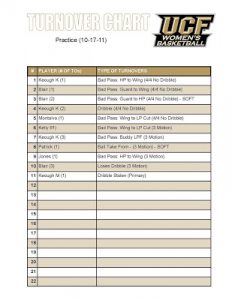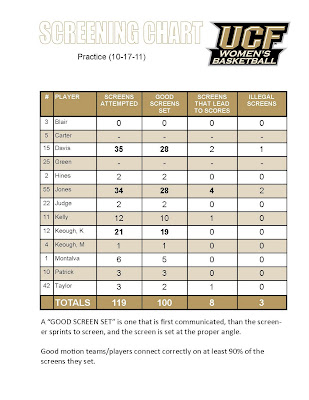
This article was written by Coach Bob Starkey.Bob Starkey is an assistant coach for the LSU Tigers women’s basketball team. He served as an assistant under head coach Gary Blair at Texas A&M from 2012 to 2021.
This article is from his blog HoopThougts which has a lot of great basketball coaching resources.
I am a big believer in that which is important must somehow be measured. We keep score during a game to measure who wins the game and who loses the game. Because we are so processed involved, it is important to measure things that are important to the process of developing what we do as a team.
We have blogged before about the need to create stats that support the parts of your game that are important for you to be successful. Good, bad or indifferent, kids are very stat conscience. They see them constantly on ESPN and in the newspapers. Your goal must be to create stats that tell a story of your success or lackthereof in what you are attempting to execute.
Now to go one step forward, if practice is the place that you lay the foundation of your system of play — and we certainly believe it is — than you need to stat your practices.
Beyond keeping stats that matter, it is important that you post those stats for your players to read and that you actually discuss them so that they understand what you are trying to get across to them. You can incorporate it in other ways. If you have an emphasis of the day, you may want to stat it so that you can talk to your team about how successful they were in that area. You can also back up your stats with video — another strong, visual support system.
For us at UCF, as we develop our motion offense, a couple of stat sheets that are important would be our “Turnover Chart” and our “Screening Chart.”
The Turnover Chart doesn’t just tell us the number of turnovers we have committed.
1. It goes in order of the turnovers
2. Tells us the player and what number of turnovers she has committed
3. Tells us what type (bad pass, bad catch, travel, etc.)
4. Tells us how (Ex: Guard to Guard Pass)
5. Tells us what phase (Motion, Primary Break, Press Offense, etc.)
What this does is show us if there is a pattern for a player or our team. If a player has four turnvers and three are LPF (low post feeds) we know that we must work on that area with that player and maybe tell her to stay away from LPF until she improves in that area. Maybe as a team we created 5 of our 12 turnovers in Transition. Then we know this is an area that we can address in video and practice.
Click the image below to enlarge it
Another chart for us that is important is the Screening Chart. On this stat sheet, we are going to chart the number of screens you set, how many of them were set properly, how many lead to scores and how many of them were illegal screens.
This is a great stat sheet to help develop roles. If you run motion, setting continual, correct screens is critical. Players that can set screens and get key people in your offense open on a consistent basis are very important — but also under appreciated by many. This stat sheet allows them to shine. It also of course, tells you who is setting screens and setting them properly.
One note: we chart illegal screens. They don’t have to be whistled by the official. If it is illegal, we will mark it so that we can correct before an official has a chance to call it.
Click the image below to enlarge it
These are just a couple of stat sheets that are relevant to the way we play. I encourage you to use your imagination. If I was a press coach, I’d have a stat sheet to chart deflections, steals and lay-ups that we give up. If I was a “pound-it-inside” coach, I’d chart paint touches — who got ’em and who threw ’em. It’s a great way to make your players think about what’s important.








